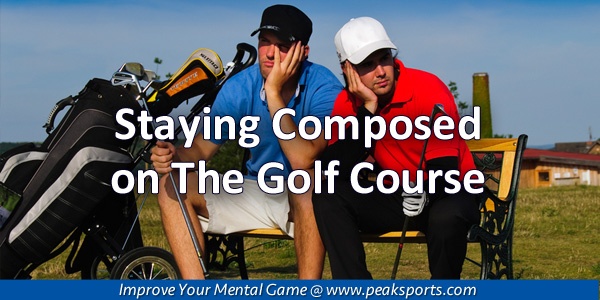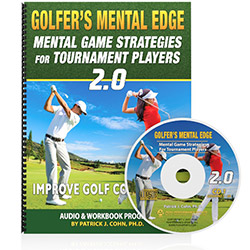
Controlling Your Emotions on The Course
Did you ever lose control on the golf course after a bad shot or hole? Have your emotions ever spiraled out of control causing you to lose focus during a round of golf?
Many golfers lose emotional control during a round…
Losing composure can range from mild frustration to total anger after a three-putt or bad shot.
Why does a golfer lose composure after a bad shot?
There are several reasons a golfer loses composure during a round but let’s look at two reasons in particular:
- Caring too much, or
- Elevated expectations about outcomes
You are probably thinking,
“I should care about my results… I spend a lot of time practicing… If I didn’t care, why would I waste my time?”
Or maybe these thoughts popped up in your mind,
“Too competitive? Isn’t the whole purpose of golf to compete?”
Yes, caring is necessary to play at a high level but there is a line where caring and competitiveness become your nemesis and stir intense negative emotions to the point you lose composure after an errant shot.
When your expectations become excessive, every shot takes on a life-or-death meaning. Think of the pressure this creates inside you… you become an emotional pressure cooker and one bad shot may blow the lid.
Adam Hadwin recently won the 2017 Valspar Championship for his first career PGA TOUR victory.
Hadwin turned professional in 2009 and took several years before earning his PGA card. Hadwin points to his early inability to maintain his composure for his early career woes.
In fact, at last year’s Valspar Championship, Hadwin broke a 7-iron after he duffed a shot on the second hole.
Entering the final round of the 2017 Valspar Championship, Hadwin lost a two-shot lead with one swing on the 16th hole when his tee shot sailed into the water and led to double bogey. This time around, Hadwin maintained his composure and closed with two pars to secure a one-shot victory.
Hadwin talked about his past struggles with composure and being too competitive.
HADWIN: “Every sport, I’ve had my issues being too competitive and wanting to win too much… I think the biggest reason that I’m sitting here today and playing so well last three or four months is really learning, really figuring that out, and understanding [my mindset] has a huge impact on how I play. It’s certainly taken my game to another level, just understanding that it’s just golf. The end of the day, it’s not life or death.”
If you can learn that a bad shot is just a shot and they happen, you will lessen the emotional impact when things do not go as planned.
Keeping your composure is ultimately tied to the importance you place on every shot and your expectations about results…
By realizing you are in control of you emotions, you can modify your reaction to mistakes so they don’t snowball into more errant shots.
How to Stay Composed on The Golf Course
Understand that you are not perfect. You are going to hit bad shots and it’s not the end of the world.
- Start by looking at the past rounds. What are the mistakes that get under your skin most often?
- Next, write down a coping action for each mistake. Your goal is to make the mistake “okay” for you so you can play on, such as “I’m not perfect. Stuff happens. Move on to the next shot/hole.”
Not only will this strategy help you react better to mistakes, you will most likely play better and enjoy the game more.
Golfer’s Mental Edge

What’s the big sign that your mental game is the weak link in your golf game? When you can’t play consistently as well as when you play a practice or casual round–or your range game is way better than your game on the course. If you suffer from lack of focus, low self-confidence, poor composure or other mental game obstacles on the course, you can’t reach your true potential in golf.
The Golfer’s Mental Edge 2.0 Audio and Workbook program is ideal for any amateur, collegiate, junior, and tour professional golfer.
Golf coaches and instructors would also be wise to teach “The Golfer’s Mental Edge 2.0” principles to their players. This program is perfect for any golfer who wants to improve performance and consistency by managing their mind better on the course.
